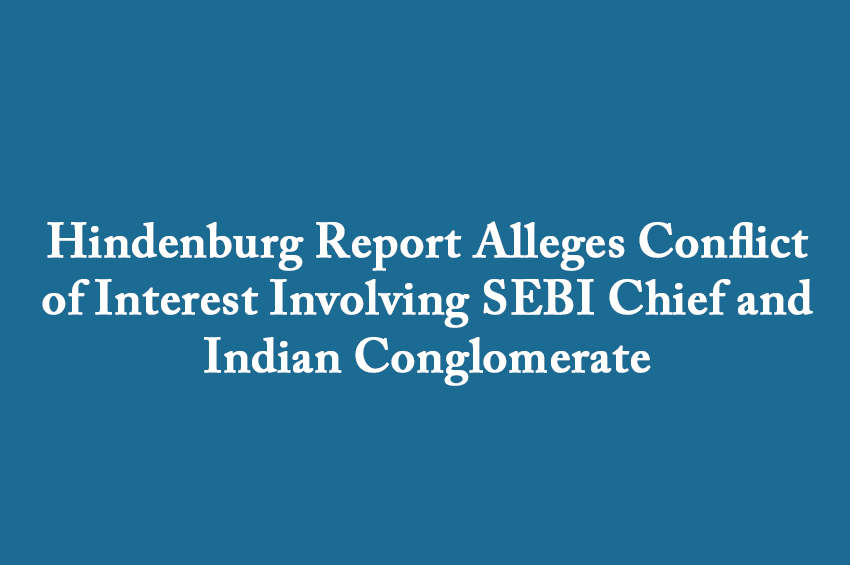Winning Bizness Desk
Mumbai. In a new report released on Saturday, U.S.- based short-seller Hindenburg Research has leveled sensational allegations against the current Chairperson of the Securities and Exchange Board of India (SEBI), Madhabi Puri Buch, and her husband Dhaval Buch. The report claims that the couple held stakes in offshore funds allegedly linked to the Adani Group’s purported money siphoning scandal. These allegations are based on "whistleblower documents," which ABP LIVE has not independently verified, suggesting a potential conflict of interest within SEBI, the regulatory body responsible for overseeing corporate governance in India.
The Hindenburg report comes nearly 18 months after its initial, highly controversial report on the Adani Group, which led to significant consequences, including the cancellation of the company’s Rs 20,000 crore follow-on public offer. The Adani Group has consistently denied all allegations, and a Supreme Court-backed SEBI investigation previously found no evidence of wrongdoing.
New Allegations on Offshore Entities
The latest allegations focus on the use of offshore entities based in Mauritius and Bermuda, which Hindenburg claims were used by Vinod Adani, the brother of Adani Group Chairman Gautam Adani, to siphon funds through the over-invoicing of power equipment imports. These funds were allegedly laundered through a network of shell companies tied to the Adani Group. Hindenburg further alleges that SEBI, under Madhabi Buch’s leadership, has shown a "surprising lack of interest" in investigating these alleged activities.
According to the report, both Madhabi Buch and her husband were involved in offshore funds in Bermuda and Mauritius, allegedly controlled by Vinod Adani. These funds were purportedly used for round-tripping funds and inflating stock prices. Hindenburg cited an email, allegedly obtained from a whistleblower, in which Dhaval Buch requested sole authorization to operate the accounts just weeks before Madhabi Buch's appointment as SEBI Chairperson. The report also mentions a 2018 account statement addressed to Madhabi Buch, revealing details of the offshore structure.
Political Reactions and Denials
The report has sparked political reactions, with Congress General Secretary Jairam Ramesh questioning the sudden adjournment of Parliament and calling for a Joint Parliamentary Committee (JPC) to investigate the matter. Ramesh implied a connection between the adjournment and the unfolding controversy, while Sena (UBT) MP Priyanka Chaturvedi also raised concerns over the allegations. Ramesh remarked on X, “Now we know why,” suggesting a connection between the sudden adjournment and the unfolding controversy. The government must act immediately to eliminate all conflicts of interest in the SEBI investigation of Adani. The fact is that the seeming complicity of the highest officials of the land can only be resolved by setting up a JPC to investigate the full scope of the Adani MegaScam," he added
Madhabi Buch and her husband have strongly denied the allegations made in the Hindenburg report. In a press statement, they described the accusations as "baseless" and insisted that their finances are transparent, with all required disclosures already provided to SEBI. They expressed their willingness to disclose any financial documents to authorities, emphasizing that their life and finances are "an open book." They added, "All disclosures as required have already been furnished to SEBI over the years. We have no hesitation in disclosing any and all financial documents, including those that relate to the period when we were strictly private citizens, to any and every authority that may seek them."
Background of the Adani-Hindenburg Dispute
Hindenburg Research’s initial report on the Adani Group in January 2023 accused the conglomerate of orchestrating the "largest con in corporate history" by manipulating stock prices and inflating revenue through a web of companies in tax havens. The report triggered a massive sell-off in Adani Group shares, wiping out over USD 150 billion in market value at its lowest point. Although the Supreme Court of India later found no regulatory lapses and concluded that no additional probes were necessary, the controversy continues to linger.


